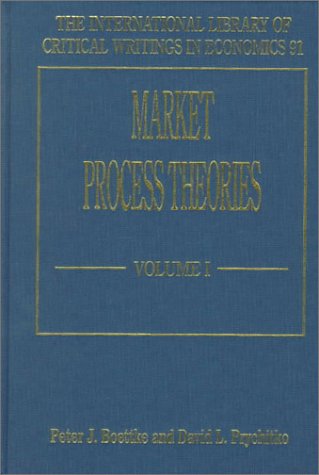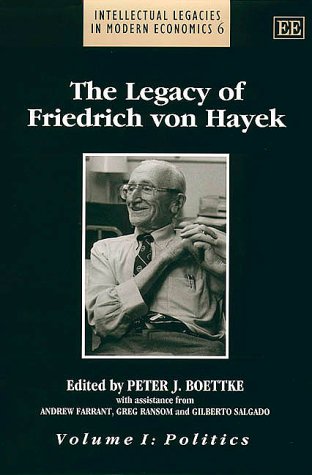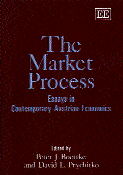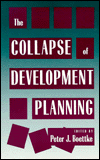The Elgar Companion To Austrian Economics |
 |
-------------------------------------------------------------------------------------------
Edited by Peter J. Boettke, Associate Professor of Economics, George Mason
University, US
-----------------------------------------------------------------------------------------------
‘The book can be recommended both to those who know something about
Austrian economics already, and to those who know nothing.’
– David Simpson, Economic Affairs
‘Mr Boettke’s very readable compendium consists of short
articles by mostly young scholars, selected to illustrate the diversity
and fecundity of modern Austrian economics.’
– Michael Prowse, The Financial Times
The Elgar Companion to Austrian Economics is a major new reference work which highlights the common ground between all the branches of the school while demonstrating the breadth and diversity within it.
The Companion reflects the many areas where Austrian economists have made contributions, including technical economics, methodology of the social sciences, political theory and political science. This book includes contributions from an international group of scholars whose work demonstrates a basic similarity and interest in questions which have historically been associated with the Austrian approach to economics, although many of the contributors would not consider themselves to be strictly of this school.
The distinguished team of contributors commissioned by the editor includes: K.D. Hoover, I.M. Kirzner, A. Klamer, D. Lavoie, C.K. Rowley, M. Rizzo, M. Rutherford, R.E. Wagner, U. Witt, L. Yeager.
Each entry is fully referenced and includes suggestions for further readings
on the topic. The Companion will be the standard reference work for all
those engaged in the field of Austrian Economics. It not only introduces
students to the Austrian school, but also serves as an important research
tool for scholars working within the Austrian tradition.
| Market Process Theories |  |
-------------------------------------------------------------------------------
Edited by Peter J. Boettke, Associate Professor of Economics, George Mason
University, US and David L. Prychitko, Head, Department of Economics,
Northern Michigan University and Faculty Affiliate in the Program on Markets
and Institutions, James M. Buchanan Center for Political Economy, George
Mason University, US
--------------------------------------------------------------------------------
Market process theory is principally concerned with explaining how the
market moves towards a state of general economic equilibrium and how production
and consumption plans become coordinated. Market Process Theories presents
in two volumes the most important articles by leading economists which
contribute to an understanding of the processes of economic coordination.
Volume I examines classical and neoclassical theories; it suggests that
many classical writers can be interpreted as having anticipated a more
dynamic disequilibrium analysis, and evaluates Marxian process theory
also in this light. Other topics include analyses of price adjustment
models, stability and disequilibria and a discussion of the challenge
of increasing returns. Volume II deals with criticisms of standard theories
such as institutionalism and post Keynesian criticisms. It also offers
an exploration of the Swedish influence in the field with papers on the
theory of savings and the concept of monetary equilibrium among others.
Austrian economics is the subject of the final section, which explores
such topics as the meaning of competition, process analysis and price
and quantity adjustment.
| The Legacy Of Friedrich Von Hayek |  |
-------------------------------------------------------------------------------
Edited by Peter J. Boettke, Associate Professor of Economics, George Mason
University, US Assisted by Andrew Farrant, George Mason University, US,
Greg Ransom, MiraCosta College, US and Gilberto O. Salgado, New York University,
US
--------------------------------------------------------------------------------
‘. . . to have [all the papers in these volumes] available for selected
study or reference in a single set of volumes is an editorial achievement
for which all with an interest in Hayek will be grateful.’
– Allen Oakley, Journal of the History of Economic Thought
This major three-volume collection – offered in the centenary year of Hayek’s birth – celebrates a lifetime of scholarship and original contributions that cross the disciplines of politics, philosophy and economics.
Hayek rose to fame as a young technical economist engaged in debate with Keynes and became infamous in middle age for his harsh critique of socialist planning. For much of the 1950s and 1960s Hayek was ignored as a relic of 19th century economic liberalism as the tide of intellectual and political fashion moved against both his warnings about Keynesian demand management and his critique of socialist planning. Late in life, Hayek was celebrated as a prescient scholar who foresaw the decline in both the Keynesian and socialist systems of economic control.
Hayek made major analytical contributions which have yet to be appreciated
by either friend or foe. Through this selection of classic articles The
Legacy of Friedrich von Hayek attempts to place Hayek’s contributions
to political economy in a proper perspective.
Contents:
Volume I: Politics
Acknowledgements • Introduction
1. John Gray (1982), ‘F.A. Hayek and the Rebirth of Classical Liberalism’
2. Viktor Vanberg (1994), ‘Hayek's Legacy and the Future of Liberal
Thought: Rational Liberalism versus Evolutionary Agnosticism’
3. Ronald Hamowy (1987), excerpt from The Scottish Enlightenment and the
Theory of Spontaneous Order
4. Viktor Vanberg (1986), ‘Spontaneous Market Order and Social Rules:
A Critical Examination of F.A. Hayek’s Theory of Cultural Evolution’
5. Douglas Glen Whitman (1998), ‘Hayek contra Pangloss on Evolutionary
Systems’
6. Steve Fleetwood (1996), ‘Order Without Equilibrium: A Critical
Realist Interpretation of Hayek's Notion of Spontaneous Order’
7. Richard Bellamy (1994), ‘’Dethroning Politics’: Liberalism,
Constitutionalism and Democracy in the Thought of F.A. Hayek’
8. Richard Vernon (1976), ‘The “Great Society” and the
“Open Society”: Liberalism in Hayek and Popper’
9. Theodore Rosenof (1974), ‘Freedom, Planning, and Totalitarianism:
The Reception of F. A. Hayek's Road to Serfdom’
10. Morris M. Wilhelm (1972), ‘The Political Thought of Friedrich
A. Hayek’
11. Ronald Hamowy (1971), ‘Freedom and the Rule of Law in F.A. Hayek’
12. Lord Robbins (1961), ‘Hayek on Liberty’
13. Jacob Viner (1961), ‘Hayek on Freedom and Coercion’
14. E.F.M. Durbin (1945), ‘Professor Hayek on Economic Planning
and Political Liberty’
15. Murray Forsyth (1988), ‘Hayek's Bizarre Liberalism: A Critique’
16. Linda C. Raeder (1997), ‘The Liberalism/Conservatism of Edmund
Burke and F.A. Hayek: A Critical Comparision’
17. Alain de Benoist (1998), ‘Hayek: A Critique’
18. Mario J. Rizzo (1985), ‘Rules Versus Cost-Benefit Analysis in
the Common Law’
19. A.I. Ogus (1989), ‘Law and Spontaneous Order: Hayek’s
Contribution to Legal Theory’
20. Bruce L. Benson (1989), ‘The Spontaneous Evolution of Commercial
Law’
21. Anna Elisabetta Galeotti (1987), ‘Individualism, Social Rules,
Tradition: The Case of Friedrich A. Hayek’
22. Eugene Heath (1989), ‘How to Understand Liberalism as Gardening:
Galeotti on Hayek’
23. Gerard Radnitzky (1987), ‘An Economic Theory of the Rise of
Civilization and Its Policy Implications: Hayek’s Account Generalized’
24. Linda C. Raeder (1998), ‘Liberalism and the Common Good: A Hayekian
Perspective on Communitarianism’
25. Karen I. Vaughn (1984), ‘The Constitution of Liberty from an
Evolutionary Perspective’
26. Peter J. Boettke (1995), ‘Hayek’s The Road to Serfdom
Revisited: Government Failure in the Argument Against Socialism’
27. Barry R. Weingast (1995), ‘The Economic Role of Political Institutions:
Market-Preserving Federalism and Economic Development’
Name Index
Volume II: Philosophy
1. Donald W. Livingston (1991), ‘Hayek as Humean’
2. Robin Cowan and Mario J. Rizzo (1996), ‘The Genetic-Causal Tradition
and Modern Economic Theory’
3. G.B. Madison (1989), ‘Hayek and the Interpretive Turn’
4. Theodore A. Burczak (1994), ‘The Postmodern Moments of F.A. Hayek’s
Economics’
5. Bruce Caldwell (1994), ‘Hayek’s Scientific Subjectivism’
6. Theodore A. Burczak (1994), ‘Reply to Bruce Caldwell: Can Subjectivism
be Non-Hermeneutic?’
7. David L. Prychitko (1989/90), ‘Methodological Individualism and
the Austrian School: A Note on its Critics’
8. G.B. Madison (1990), ‘How Individualistic is Methodological Individualism?’
9. Joseph Agassi (1975), ‘Institutional Individualism’
10. Steven Lukes (1968), ‘Methodological Individualism Reconsidered’
11. Joseph Agassi (1960), ‘Methodological Individualism’
12. Walter B. Weimer (1982), ‘Hayek's Approach to the Problems of
Complex Phenomena: An Introduction to the Theoretical Psychology of The
Sensory Order’
13. Rosemary Agonito (1975), ‘Hayek Revisited: Mind as the Process
of Classification’
14. Gary T. Dempsey (1996), ‘Hayek’s Terra Incognita of the
Mind’
15. Edna Ullmann-Margalit (1978), ‘Invisible-Hand Explanations’
16. A.M. Macleod (1983), ‘Justice and the Market’
17. A.W. Cragg (1983), ‘Hayek, Justice and the Market’
18. Eric Mack (1983), ‘Hayek on Justice and the Market: A Reply
to MacLeod’
19. A.M. Macleod (1983), ‘Hayek on Justice and the Market: A Rejoinder
to Cragg and Mack’
20. Eugene Heath (1992), ‘Rules, Function, and The Invisible Hand:
An Interpretation of Hayek's Social Theory’
21. Edna Ullmann-Margalit (1997), ‘The Invisible Hand and the Cunning
of Reason’
22. Lee Cronk (1988), ‘Spontaneous Order Analysis and Anthropology’
23. Nigel Pleasants (1997), ‘The Epistemological Argument Against
Socialism: A Wittgensteinian Critique of Hayek and Giddens’
24. Daniel B. Klein (1992), ‘Go Ahead and Let Him Try: A Plea for
Egonomic Laissez-faire’
25. Marina Bianchi (1993), ‘How to Learn Sociality: True and False
Solutions to Mandeville’s Problem’
Name Index
Volume III: Economics
1. Fritz Machlup (1974), ‘Friedrich von Hayek's Contribution to
Economics’
2. M. Polanyi (1941), ‘The Growth of Thought in Society’
3. Sanford J. Grossman and Joseph E. Stiglitz (1980), ‘On the Impossibility
of Informationally Efficient Markets’
4. Richard R. Nelson (1981), ‘Assessing Private Enterprise: An Exegesis
of Tangled Doctrine’
5. Manfred E. Streit (1984), ‘Information Processing in Futures
Markets - An Essay on Adequate Abstraction’
6. Stephan Böhm (1989), ‘Hayek on Knowledge, Equilibrium, and
Prices: Context and Impact’
7. Carlo Zappia (1996), ‘The Notion of Private Information in a
Modern Perspective: A Reappraisal of Hayek's Contribution’
8. Bruce J. Caldwell (1988), ‘Hayek’s Transformation’
9. Sanford Ikeda (1990), ‘Market-Process Theory and “Dynamic”
Theories of the Market’
10. Israel M. Kirzner (1967), ‘Methodological Individualism, Market
Equilibrium, and Market Process’
11. Israel M. Kirzner (1997), ‘Entrepreneurial Discovery and the
Competitive Market Process: An Austrian Approach’
12. Mario J. Rizzo (1990), ‘Hayek’s Four Tendencies Toward
Equilibrium’
13. William N. Butos (1985), ‘Hayek and General Equilibrium Analysis’
14. Gottfried Haberler (1986), ‘Reflections on Hayek’s Business
Cycle Theory’
15. Roger W. Garrison (1985), ‘Intertemporal Coordination and the
Invisible Hand: An Austrian Perspective on the Keynesian Vision’
16. Don Bellante and Roger W. Garrison (1988), ‘Phillips Curves
and Hayekian Triangles: Two Perspectives on Monetary Dynamics’
17. Roger Garrison (1984), ‘Time and Money: The Universals of Macroeconomic
Theorizing’
18. Steven Horwitz (1996), ‘Capital Theory, Inflation, and Deflation:
The Austrians and Monetary Disequilibrium Theory Compared’
19. George A. Selgin and Lawrence H. White (1994), ‘How Would the
Invisible Hand Handle Money?’
20. Bruce Caldwell (1997), ‘Hayek and Socialism’
Name Index
| The Market Process |  |
--------------------------------------------------------------------------------
Essays in Contemporary Austrian Economics
--------------------------------------------------------------------------------
Edited by Peter J. Boettke, Associate Professor of Economics, George Mason
University, US and David L. Prychitko, Head, Department of Economics,
Northern Michigan University and Faculty Affiliate in the Program on Markets
and Institutions, James M. Buchanan Center for Political Economy, George
Mason University, US
--------------------------------------------------------------------------------
‘The scholarly publication [the journal] Market Process played the
central role in the transformation of the market process school from a
hesitant subset of traditional Austrian economics into a bold new research
programme. . . . The articles included here are among the best of contributions
the Austrian school has ever made, and deserve to be given a wider readership.’
– From the foreword by Don Lavoie
The Market Process presents a series of important and innovative articles written by economists of the Austrian School. Covering the gamut of economic issues, including equilibrium theory, free banking, public choice, and the problems of contemporary social reform, the book is an ideal introduction to the diversity of contemporary Austrian economics and its innovative trajectory of research in the late twentieth century.
Drawing upon essays published in the journal Market Process during the 1980s, this book reflects an extended dialogue over the value and limitations of Austrian economics. It makes available to a wider audience contributions by some of the leading figures in the field. At the cutting edge of interdisciplinary research, it incorporates the latest developments in areas overlooked by neoclassical economists including process analysis, methodological subjectivism, and phenomenological hermeneutics.
This book should be of interest to all those who seek an alternative
to formal, neoclassical economics, as well as other researchers in the
social sciences who study exchange processes. In addition, it will be
of general interest to Austrian and public choice economists as well as
historians of economic thought.
| Collapse of Development Planning |  |
---------------------------------------------------------------------------------
Peter J. Boettke
ISBN 0814712258
296 pages
Paperback
Publication date: 7/1/1994
---------------------------------------------------------------------------------
Conventional wisdom has it that government management of the economy
is the means to transform a backward economy into a dynamic, modern one.
Yet, after decades of international aid programs, development planning
is today largely perceived as a failure paralyzed by its own bureaucracy
and inefficiency. Despite billions of dollars of investment, development
successes are few and far between and waste and mismanagement abounds.
This book showcases a diverse range of development experiences in order
to ascertain the reasons for this quagmire. Case studies of development
planning in China, India, post-WWII Japan, South Korea, Africa, and Eastern
Europe, and of foreign aid programs (including the Marshall Plan) illustrate
the insights an Austrian approach provides toward an understanding of
the failure of government development planning. While economists working
within the Austrian tradition have previously addressed development issues,
this volume represents the first full-length treatment of the subject
from a modern market process perspective. Exploding the hegemony of the
traditional development paradigm, The Collapse of Development Planning
addresses one of the most pressing issues of international political economy.
Contributing to the volume are: George Ayittey (American University),
Wayne T. Brough (Citizens for a Sound Economy, Washington, DC), Young
Back Choi (St. John's University), Steven Hanke (Johns Hopkins University),
Steve Horwitz (St. Lawrence University), Shyam J. Kamath (California State
University, Hayward), Shigeto Naka (Hiroshima City University), David
Osterfeld (St. Joseph's College), Manisha Perera (University of Northern
Colorado), Jan S. Prybyla (Pennsylvania State University), Ralph Raico
(State University College, Buffalo), Parth Shah (University of Michigan,
Dearborn), Kurt Schuller (Johns Hopkins University), Kiyokazu Tanaka (Sophia
University, Tokyo), and Mark Thorton (Auburn University).
-----------------------------------------------------------------------------------
Table of Contents
Acknowledgments
1 Introduction 1
2 Money and Capital in Economic Development 15
3 The Theory of Economic Development and the "European Miracle"
37
4 The Political Economy of Development in Communist China: China and the
Market 61
5 The Failure of Development Planning in India 90
6 The Failure of Development Planning in Africa 146
7 The World Bank and the IMF: Misbegotten Sisters 185
8 Does Eastern Europe Need a New (Marshall) Plan? 210
9 Industrial Policy as the Engine of Economic Growth in South Korea: Myth
and Reality 231
10 The Political Economy of Post-World War II Japanese Development: A
Rent-Seeking Perspective 256
11 Privatization and Development: The Case of Sri Lanka 289
12 Financial Reform and Economic Development: The Currency Board System
for Eastern Europe 310
Contributors 327
Index 331